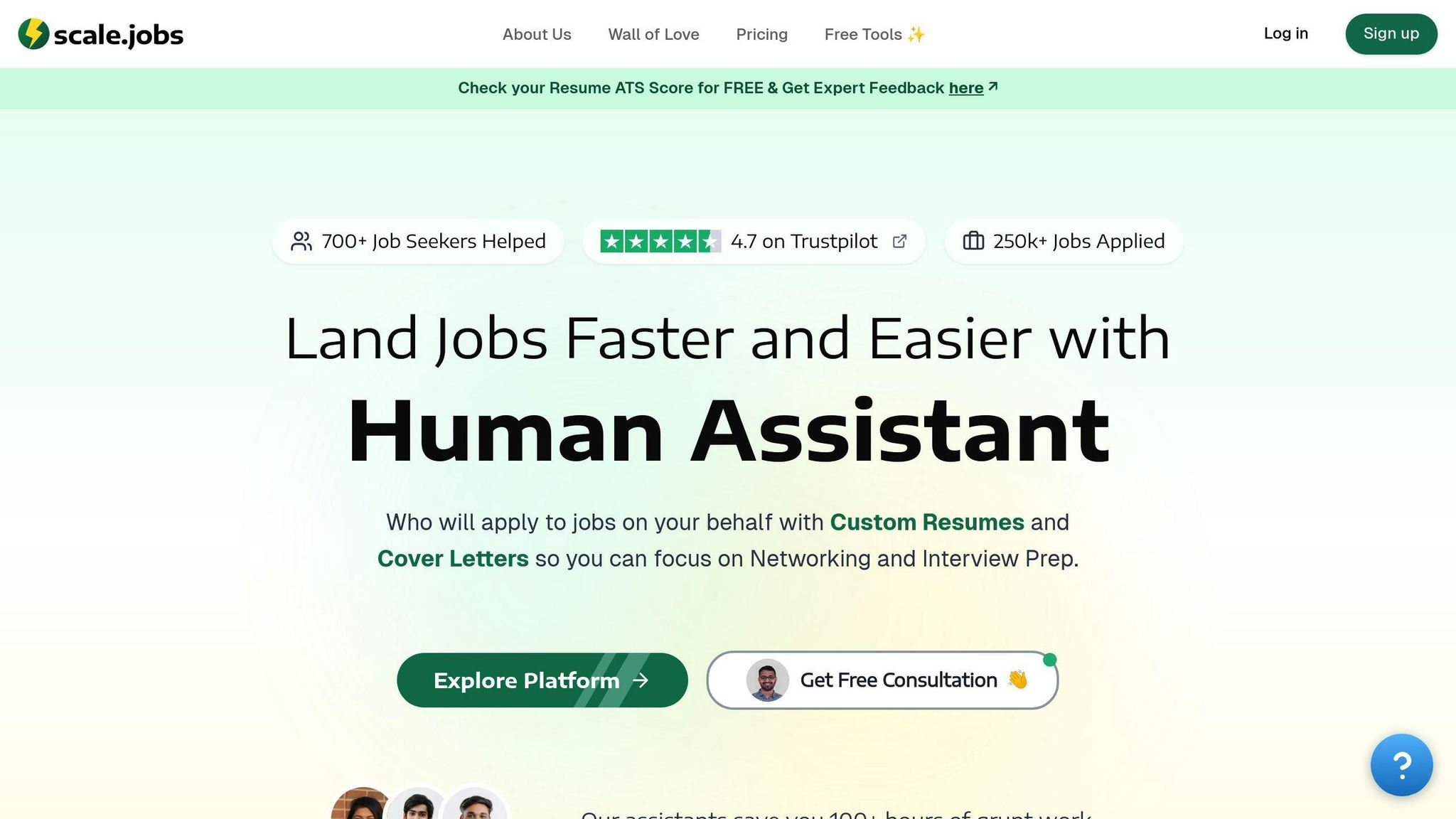7 Emotional Cues to Watch in Salary Negotiations
Master emotional cues to enhance your salary negotiations, build trust, and achieve better outcomes through effective communication.

Salary negotiations aren't just about numbers - they're about understanding and responding to emotions. By mastering emotional cues, you can navigate conversations effectively and secure better outcomes. Here's what to watch for:
- Tone Shifts: Changes in voice pitch, volume, or hesitation can signal uncertainty, enthusiasm, or disagreement.
- Body Language: Posture, gestures, and eye contact reveal openness, interest, or defensiveness.
- Facial Expressions: Micro-expressions like raised eyebrows or tight lips indicate emotions like surprise or discomfort.
- Active Listening: Nods, paraphrasing, and thoughtful questions show engagement and build trust.
- Empathy: Acknowledge emotions to strengthen collaboration and mutual understanding.
- Emotional Regulation: Stay composed by recognizing triggers and pausing before responding.
- Non-Verbal Signals: Timing patterns and subtle gestures provide additional insight into the other party's mindset.
Labeling Emotions Will CHANGE Their Perception Of YOU
Emotional Intelligence in Salary Negotiations
Emotional intelligence (EI) plays a key role in understanding the subtle cues that drive salary discussions. By honing EI skills, you can navigate these conversations with greater awareness and confidence.
Here are the three main elements of emotional intelligence in negotiations:
- Self-awareness: Knowing your emotional triggers helps you maintain composure and avoid knee-jerk reactions during discussions.
- Empathy: Seeing things from your employer's perspective encourages collaboration without losing sight of your own goals.
- Social Skills: Picking up on and responding to social cues helps build trust and improve communication.
Let’s break down how these elements influence the negotiation process:
| EI Component | How It’s Used | Why It Matters |
|---|---|---|
| Self-awareness | Recognize emotional reactions | Stay calm and professional |
| Empathy | Understand employer concerns | Reach solutions that work for both sides |
| Social Skills | Respond to verbal and non-verbal cues | Build rapport and trust |
When you apply these skills effectively, you can:
- Adjust your strategy based on the other person’s reactions
- Build stronger, more productive relationships
- Tackle tough conversations with confidence
- Work toward agreements that satisfy both parties
With consistent practice, emotional intelligence becomes a powerful tool for reading the room, shifting your approach as needed, and achieving better results in salary negotiations. Up next, we’ll dive into identifying specific emotional cues to further refine your strategy.
1. Tone Shifts
Tone shifts can reveal a lot about the emotional dynamics at play during salary negotiations. By paying attention to these vocal changes, you can better understand your employer's position and adjust your strategy accordingly.
Here are some common tone patterns to listen for:
| Tone Pattern | What It Signals | How to Respond |
|---|---|---|
| Sudden hesitation | Uncertainty or budget constraints | Address concerns directly and suggest flexible options |
| Increased enthusiasm | Interest in your proposal | Highlight your achievements to maintain momentum |
| Firm or assertive shift | Setting boundaries or limits | Shift the focus to the value you bring to the table |
| Change in pitch/volume | Discomfort or disagreement with terms | Pause to ask clarifying questions or summarize their concerns |
Recognizing Key Signals
When salary ranges are being discussed, moments of hesitation in tone can be particularly telling. These pauses can help you gauge how your employer feels about your proposal and allow you to adjust your approach.
How to Respond
Match your response to the tone you notice. For example, if you sense enthusiasm, emphasize your qualifications and successes. If you detect hesitation, be ready to suggest alternative solutions.
The Role of Active Listening
Improving your ability to pick up on tone shifts starts with active listening. Pay close attention to elements like pace, pitch, volume, and emotional undertones. At the same time, maintain a calm and confident tone yourself to encourage trust and collaboration.
While tone shifts provide vocal clues, don’t forget that body language can offer equally important non-verbal insights into your employer's state of mind.
2. Body Language
Body language plays a crucial role in salary negotiations by conveying emotions and intentions without words. These non-verbal signals can significantly influence the outcome, making it essential to understand and respond to them effectively.
| Body Language Signal | What It Indicates | Strategic Response |
|---|---|---|
| Crossed Arms | A closed-off or defensive stance | Ease tension by asking open-ended questions and addressing concerns |
| Leaning Forward | Interest and engagement | Stay on course and build on the positive momentum |
| Relaxed Posture | Openness and receptivity | Present your key points confidently while maintaining a friendly tone |
Reading Physical Cues
Research shows that more than half of communication relies on nonverbal signals. Pay attention to these key cues:
- Hand movements and posture: Open palms and upright sitting suggest honesty and attentiveness.
- Eye contact: Steady eye contact signals confidence and builds trust.
- Head positioning: Nodding often reflects agreement, while a slight tilt might indicate doubt or curiosity.
Managing Your Own Body Language
Your own body language matters just as much. Here’s how to stay in control:
- Keep an open posture - avoid crossing your arms or legs.
- Sit at a slight angle rather than directly face-to-face to appear approachable.
- Use natural hand gestures to emphasize your points without overdoing it.
- Subtly mirror the other person's positive body language to create a sense of connection.
Building Trust Through Non-verbal Communication
Align your body language with your words to appear consistent and trustworthy. This helps create a solid foundation for understanding the emotions and intentions shaping the negotiation.
While body language provides valuable insights, don’t overlook facial expressions - they often reveal even deeper emotional cues to guide your next steps.
3. Facial Expressions
Facial expressions can reveal emotions that words might not. Understanding these subtle cues can help you navigate salary negotiations more effectively.
Key Facial Indicators and Their Meanings
| Expression | Meaning | How to Respond |
|---|---|---|
| Raised Eyebrows | Surprise or skepticism | Offer more details or context |
| Genuine Smile (eye corners wrinkle) | Agreement or satisfaction | Build on the positive momentum |
| Furrowed Brow or Tight Lips | Discomfort or disagreement | Pause and address their concerns |
Spotting and Managing Expressions
Micro-expressions - those fleeting emotional flashes - can reveal what someone is really feeling before they mask it. Keep an eye out for:
- Quick frowns when discussing specific numbers.
- Tension around the mouth during counteroffers.
As one expert puts it:
"Positive expressions can get the other party engaged, and more willing to find an integrative solution."
To manage your own expressions during negotiations:
- Maintain a calm, neutral expression while staying engaged.
- Use genuine smiles when appropriate to build rapport.
- Avoid showing frustration or disappointment, even if a counteroffer isn't ideal.
4. Active Listening
Active listening can make a big difference in salary negotiations. It helps you catch subtle emotional cues like changes in tone or pauses. This isn't just about hearing words - it's about showing you're fully engaged through your actions.
Key Components of Active Listening
| Behavior | How It Helps in Negotiations |
|---|---|
| Nodding | Encourages the other person to keep talking |
| Eye Contact | Builds a sense of trust and connection |
| Paraphrasing | Ensures clarity and avoids miscommunication |
| Questions | Shows you're genuinely interested |
Recognizing Listening Signals
When the other person uses active listening, it often means they're seriously considering what you're saying. Look out for:
- Pauses to think before answering
- Taking notes while you talk
- Maintaining eye contact with an open posture
- Verbal cues like "I understand" or "That makes sense"
"Active listening helps build trust and rapport by demonstrating that you value and respect the other party's thoughts and feelings. This can lead to a more collaborative and mutually beneficial negotiation outcome."
How to Apply It Effectively
Focus on understanding the other person's perspective instead of just waiting to reply. For instance, if your employer mentions concerns, try this approach:
- Acknowledge: "I understand budget constraints are a factor..."
- Inquire: "Could you explain how this impacts the salary range for this position?"
This approach shows you're processing their viewpoint thoughtfully.
Strengthening Trust Through Listening
Avoid cutting them off, rushing to respond, or ignoring their concerns - these actions can erode trust. Instead, keep steady eye contact and stay engaged to build a stronger connection.
Active listening not only improves trust but also encourages collaboration, leading to better negotiation results. While it sets the stage for understanding, empathy takes it further by addressing emotions directly.
5. Empathy and Validation
Empathy goes beyond active listening by addressing the emotions behind the words, helping to strengthen trust in conversations.
Recognizing Empathetic Responses
When employers show empathy, they often rely on specific verbal and non-verbal cues. Here are some key signals to look for:
| Signal Type | Indicators | What It Means |
|---|---|---|
| Verbal & Tone | Phrases like "I understand your perspective on..." and a softer, collaborative tone | Acknowledges your stance and invites open discussion |
| Response | Thoughtful follow-up questions and pauses for reflection | Shows genuine interest and careful consideration |
Building Trust Through Validation
Validation happens when your perspective is acknowledged as legitimate, creating a foundation for meaningful dialogue and fair outcomes.
Spotting Genuine Empathy
It’s important to gauge whether the empathy you’re receiving feels sincere or forced. Genuine empathy often includes:
- Steady eye contact while you share concerns
- Natural mirroring of your emotional tone
- Specific references to points you’ve raised
- Acknowledgment of both your needs and the employer’s, with concrete examples
Responding to Empathy
When you observe authentic empathy, respond in kind to maintain a collaborative tone. For example, if your employer mentions budget challenges, acknowledge their concerns while still emphasizing your value.
Empathy is a two-way street. By showing you understand your employer’s perspective, you can encourage a more open and flexible negotiation process.
Balancing empathy with emotional awareness allows you to stay composed and focused on your goals. Recognizing and responding to empathetic cues helps you guide the conversation toward a positive outcome while preserving a good working relationship.
6. Emotional Regulation
Emotional regulation plays a key role in salary negotiations, helping you stay calm and professional even under pressure.
Key Elements and How to Apply Them
| Aspect | Purpose | How to Apply |
|---|---|---|
| Self-Awareness | Recognize emotional triggers in tense moments | Observe your physical and mental reactions, then adjust your approach |
| Response Control | Stay calm and deliberate in your responses | Practice deep breathing and mindfulness to stay composed |
| Strategic Pausing | Process information thoroughly before responding | Take short pauses when needed (e.g., "Let me review these details for a moment") |
Navigating Stressful Situations
Mastering emotional regulation involves both mental and physical techniques:
- Keep your breathing steady and your facial expressions neutral.
- Maintain an open, confident posture.
- Research salary benchmarks thoroughly to stay prepared.
- Anticipate potential challenges and practice your responses.
- Focus on facts and data instead of letting emotions take over.
Strengthening Emotional Regulation
To improve, practice identifying emotional responses as they arise. Instead of reacting impulsively, take a moment to choose a thoughtful response. This approach helps keep conversations productive, even when they become difficult.
Why It Matters Staying emotionally balanced fosters a positive atmosphere, encouraging constructive dialogue and better outcomes. Plus, these skills are valuable beyond negotiations, contributing to your overall professional development.
7. Non-Verbal Signals
Non-verbal signals, such as physical movements and timing patterns, can reveal subtle clues that shape your negotiation strategy. Paired with changes in tone and empathetic responses, these signals help you understand the emotional flow of the discussion.
Key Non-Verbal Signals to Watch
| Signal Type | What to Look For | Possible Meaning |
|---|---|---|
| Body Language | Leaning forward/backward, changes in stance | Interest or lack of engagement |
| Timing Patterns | Long pauses, rushed replies | Hesitation or eagerness |
| Subtle Gestures | Hand movements, head tilts | Agreement or uncertainty |
Interpreting and Reacting to Non-Verbal Cues
Context is critical when analyzing non-verbal signals. For example, a pause doesn’t always mean hesitation - it could signal careful thought. Focus on patterns over isolated actions to get a clearer picture of intent and emotion.
Techniques for Effective Responses
Mirror Positive Gestures: Subtly reflect positive movements, like leaning in when they do, to create a sense of connection. Avoid mimicking closed-off gestures, such as folded arms, as this can come across as defensive.
Use Pauses Wisely: Pauses in conversation can be a powerful tool. They allow you to:
- Let the other person process information
- Show you value their input
- Open the door for deeper dialogue
Strengthening Trust with Non-Verbal Communication
Keep steady eye contact, adopt open and approachable body language, and ensure your non-verbal cues match your words. A calm, composed presence not only builds trust but also reinforces your message during negotiations.
Using Emotional Intelligence in Negotiations
Excelling in salary negotiations often comes down to combining self-awareness with strong interpersonal skills. Studies indicate that being in tune with your emotions - and those of your employer - can have a noticeable effect on the outcome.
Building Trust Through Emotional Awareness
Creating a solid connection with your employer is key to successful negotiations. Keep your body language open and maintain steady eye contact to show interest without coming across as confrontational.
| Emotional Component | How to Apply It | What It Achieves |
|---|---|---|
| Self-Awareness | Pay attention to your emotions and breathing | Helps you stay calm in tough situations |
| Empathy | Actively listen and acknowledge their concerns | Builds mutual understanding |
| Emotional Regulation | Pause briefly before responding to difficult topics | Keeps emotions from steering the conversation |
Strategic Response Techniques
When emotions surface during negotiations, respond thoughtfully. Recognize your employer’s viewpoint before making your case to encourage a cooperative tone.
Practical Implementation Steps
Do Your Homework: Research salary ranges and the company’s financial health. This preparation boosts your confidence and helps you stay composed.
Engage Actively: Ask open-ended questions to show you understand their perspective. Instead of rejecting a salary offer outright, ask about the reasoning behind it.
Communicate Mindfully: Use phrases that promote collaboration and keep the conversation open-ended.
Managing Challenging Moments
If the discussion becomes tense:
- Stay calm with controlled breathing and deliberate responses.
- Address budget limitations while reinforcing your value.
- Back up your stance with well-researched data and preparation.
How Scale.jobs Supports Negotiation Preparation

Preparing for salary negotiations can be challenging, but Scale.jobs offers a range of tools and services to make the process smoother and more effective.
Market Value Assessment
With the Salary Predictor tool, you get accurate salary estimates based on market data. This helps you set realistic expectations, back up your requests with solid information, and identify trends in your industry.
Preparation Support
Scale.jobs provides a virtual assistant service for just $4/hour to handle your job applications. This frees up your time to focus on critical tasks like researching the market, networking, and practicing for interviews. With this extra time, you can hone emotional intelligence skills, such as self-awareness and adaptability, which are key for successful negotiations.
Integrated Tools
Scale.jobs also offers free resources like the Resume ATS Checker, Interview Questions Predictor, and Job Applications Tracker. These tools ensure your qualifications are presented effectively and help you stay organized while managing multiple opportunities, giving you a stronger position during negotiations.
Broad Support for Jobseekers
Whether you're a recent graduate, a seasoned professional, or an international candidate dealing with visa complexities, Scale.jobs caters to your needs. By providing time-saving tools and actionable insights, the platform helps you focus on refining skills like empathy and communication, which are essential for effective salary discussions.
With these resources, you can approach negotiations with confidence and a clear strategy.
Conclusion
Mastering emotional cues can have a direct impact on your career and earning potential. Studies show that people who skillfully use emotional intelligence during negotiations tend to secure better results while preserving strong professional relationships.
Understanding emotional signals goes beyond basic communication skills. By paying attention to shifts in tone, body language, and facial expressions, you open the door to deeper conversations and stronger connections. As Margaret A. Neale explains:
Expressing positive emotions may increase the willingness of your counterpart to agree to your proposals and to view you and the situation in a better light
Successful negotiations rely on a combination of emotional intelligence, trust, and composure. Key elements include:
- Managing your own emotions effectively
- Interpreting and responding to the other person's emotional signals
- Building trust through active listening and genuine empathy
- Staying composed, even in difficult moments
Tools like Scale.jobs' Salary Predictor can provide data to strengthen your negotiation strategy, while their $4/hour virtual assistant service helps free up your time to focus on preparation and honing your emotional intelligence.
Emotional intelligence in negotiations isn't just about identifying cues – it’s about creating an environment of mutual understanding and respect. By applying these practices consistently, you’ll be better prepared to handle salary discussions and achieve successful outcomes.
FAQs
Here are answers to some common questions about emotional cues in salary negotiations to help you prepare effectively.
What is body language in salary negotiation?
Body language in salary negotiations includes non-verbal signals that shape how others perceive you. Key elements include keeping steady eye contact, maintaining an open posture, and using intentional gestures. Studies suggest that these physical cues can greatly influence the perception of your negotiation stance.
How can I use emotional intelligence to read body language?
Emotional intelligence allows you to pick up on subtle changes in body language, such as shifts in posture or fleeting facial expressions, that reveal emotions. Pay attention to:
- Small adjustments in posture or facial expressions
- Changes in tone of voice or speaking speed
- Responses that indicate resistance or agreement
- Building connection through appropriate mirroring techniques
"Emotional expression can be appropriate, depending on who you are negotiating with. Depending on the choice of expression, it can be a double-edged sword that can go either way".
What are common body language mistakes to avoid?
Certain body language habits, like crossed arms or avoiding eye contact, can weaken your position in negotiations. Here's a quick guide:
| Mistake | What to Do Instead |
|---|---|
| Slouching | Sit or stand with a straight posture |
| Over-nodding | Nod sparingly and with intention |
| Crossing arms defensively | Keep your arms relaxed and open |
For added confidence, tools like Scale.jobs' Salary Predictor can equip you with reliable data, helping you project confidence and ensuring your body language aligns with your preparation.




